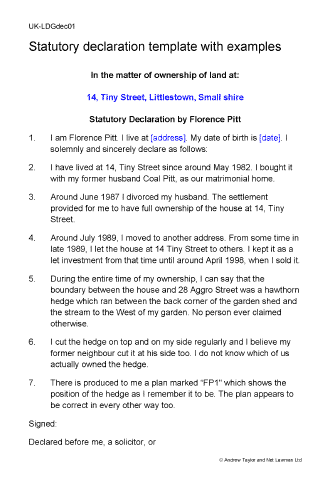Statutory declaration template with examples

Document overview

 England & Wales
England & Wales Scotland
Scotland

- Length:3 pages (1000 words)
- Available in:
 Microsoft Word DOCX
Microsoft Word DOCX Apple Pages
Apple Pages RTF
RTF

If the document isn’t right for your circumstances for any reason, just tell us and we’ll refund you in full immediately.

We avoid legal terminology unless necessary. Plain English makes our documents easy to understand, easy to edit and more likely to be accepted.

You don’t need legal knowledge to use our documents. We explain what to edit and how in the guidance notes included at the end of the document.

Email us with questions about editing your document. Use our Lawyer Assist service if you’d like our legal team to check your document will do as you intend.

Our documents comply with the latest relevant law. Our lawyers regularly review how new law affects each document in our library.
What is a statutory declaration?
A statutory declaration (sometimes abbreviated to stat dec) is a written statement that something is true to the best knowledge of the person making it.
To make sure that a statutory declaration is made by the person recorded as doing so, there is a legal requirement that the document is signed in front of an authorised witness: a solicitor, commissioner for oaths or notary public. Effectively, that person attests that they have identified the maker and seen them sign their name.
Lawyers often refer loosely to an oath or swearing. Oaths are occasionally required, but more often than not, they mean a notarised declaration which is declared not sworn. When you make a statutory declaration you don't swear it. You simply declare it.
Statutory declarations are governed by the Statutory Declarations Act 1835. By law they must contain certain wording that frames the statement of truth being made.
When to use this document
Statutory declarations are made when there is a legal requirement to use one or when there is no better evidence available as to the fact that is declared.
By definition, a statutory declaration tells a unique story about your circumstances. As such, there can be no template that provides the precise wording applicable to your own situation.
This 'document' is actually three different example statutory declarations. From the example text given, you will have some idea how to frame your own story.
In particular, examples and advice are given on the opening and closing words.
The three examples given relate to:
- the validity of a document in a litigation matter
- the position of a disputed boundary in a garden
- lost title deeds
Other uses
Other common situations in which statutory declarations are used include the following. Although our templates do not cover these uses, we can provide the wording on request.
You can declare that you have changed your name and that you would like other people to use it. However, in most cases using a deed of change of name is easier because it does not have to be notarised. You can make a deed poll without needing any special witness.
Some financial institutions will only transfer money to the executors of a Will or administrators of a deceased person's estate if they make a statutory declaration that they have authority to administer that estate. However, a copy of the grant of probate (or letters of administration) is usually better evidence to provide.
You can declare something about yourself that otherwise can't easily be proven, such as your nationality or marital status if you were born in a country that never issued you with a birth certificate or marriage certificate.
Company directors can declare that a company that is going into voluntary liquidation is solvent.
The origin, ownership and nature of assets (including goods for import or export and intellectual property) can be declared.

Recent reviews
Thank you. The form was easy to use thank you for supplying the form. I am not too computer savvy but found it easy to us.
I found your service informative and helpful. The only draw back was my declaration was for a different matter than the templates provided yet I was still able to adapt and successfully use it. I thought the cost was reasonable too.
I would use your services again.
Many thanks
Arthur Whitehead
Choose the level of support you need
Document Only
This document
Detailed guidance notes explaining how to edit each paragraph
Bespoke
A document drawn just for you to your exact requirements
Personalised service provided by an experienced solicitor
Free discussion before we provide an estimate, for you to ask questions and for us to understand your requirements
Transparent fees - a fixed fee for the basic work, a fixed hourly rate for new or changed instructions, and no charge for office overheads or third party disbursements
Careful and thorough consideration of your circumstances and your consequent likely practical and legal requirements
Provision of options that you may not have considered with availability for discussion
Help and advice woven into the fabric of our service so that you can make the best decisions
All rights reserved
